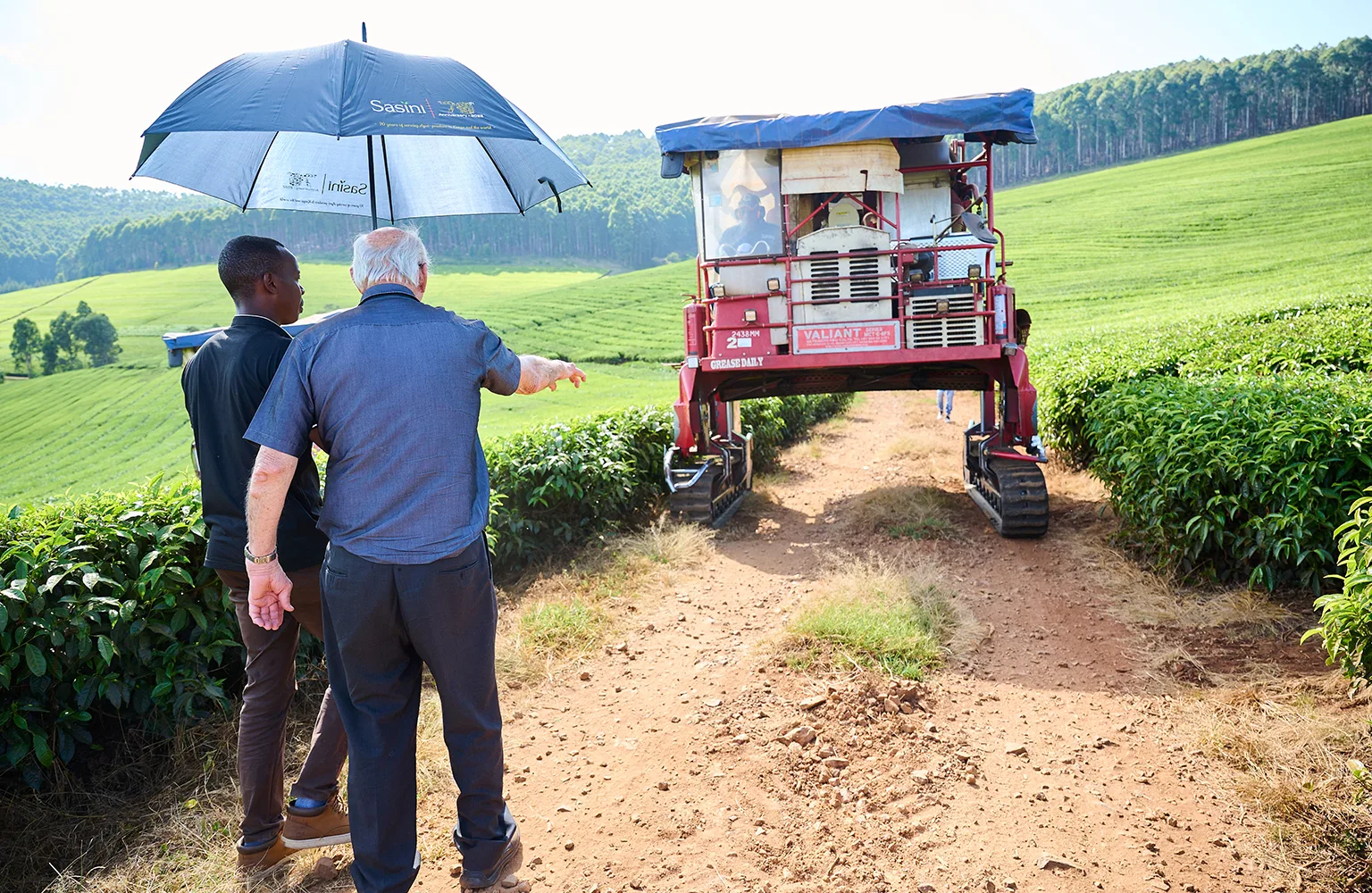More than just a buzzword, sustainability drives Sasini PLC forward day in, day out. Martin Ochien’g, Group Managing Director and CEO, reflects on the company’s ongoing support for local communities and the environment as it anticipates a bright future.
A SUSTAINABLE OPERATION
Driven by strong domestic crop production, agriculture is arguably the backbone of the African economy.
Kenya is a prime example, as between 60 and 65 percent of the nation’s GDP is generated by the agriculture industry – with Sasini PLC (Sasini) at the core.
“We pride ourselves on being a local organisation that feeds the world,” opens Group Managing Director and CEO, Martin Ochien’g.
Founded in 1952 and listed on the Nairobi Securities Exchange (NSE), Sasini is East Africa’s largest agricultural business, employing around 2,600 members of staff.
“Our business involves growing, processing, packaging, marketing, and exporting tea, coffee, macadamia, and avocado to markets as far east as Japan and South Korea, and as far west as Canada and the US, and everything in between,” he explains.
Selling its tea predominantly to Pakistan and the UK, coffee to the US and Europe, macadamia to the US, and avocados to Central Europe, Sasini demonstrates its global reach.
As an export business, all of Sasini’s produce is shipped abroad, with half of the company’s crops cultivated in its own plantations and the rest sourced from local, small-scale farmers.
Over the years, however, Kenya’s agricultural sector has not been without its challenges. Upheaval has been experienced in terms of climate change and the effect it has had on reliable rainfall, leading to organisations putting water stewardship measures in place to mitigate against harsh weather conditions.
Meanwhile, macroeconomic factors such as disruption of logistics due to the closure of the Suez Canal have limited the transit of goods to Europe and the Northern Hemisphere.
Despite such obstacles, Sasini has a robust business strategy in place that is deeply rooted in sustainability to ensure its success for years to come.
“Sustainability is the single most important driver for our business,” Ochien’g asserts.
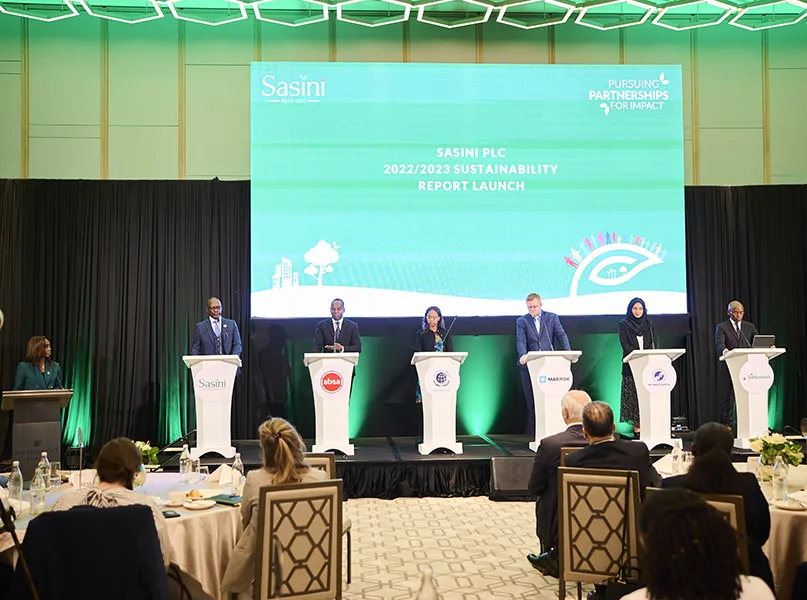
A RENEWED PERSPECTIVE
Historically, as an agricultural company, much of Sasini’s activities have been sustainable by default.
However, over the last six years, the business has become sustainable by design, having chosen specific sustainable development goals (SDGs) with science-based targets.
“Our focus on sustainability is what differentiates us, not because we want to stand out, but because we want to be a good corporate citizen and ensure that we’re here for eternity,” Ochien’g reflects.
Sasini’s comprehensive business strategy includes bed rocking everything it does around nine distinctive SDGs alongside various environmental, social, and governance (ESG) aims.
“Our SDGs range from gender equality, education, and good health to technology, innovation, life on land, and all other aspects that affect our business,” he clarifies.
Another of Sasini’s SDGs is centred around implementing clean, renewable energy.
Generating 95 percent of its power from renewable sources such as hydroelectricity, Kenya can be considered relatively advanced in this field.
“However, that doesn’t mean organisations based here in Kenya should rest on their laurels,” Ochien’g warns.
“Excess water from hydroelectricity could also be used for agricultural purposes, damming, or to drive irrigation. It’s up to organisations like us to make that shift towards utilising every resource responsibly.”
For example, early last year, Sasini commissioned a 1.5 megawatt (MW) solar power generation plant for its tea business, which replaced around 30 percent of the company’s electricity consumption from the national grid.
“In this way, we’re using naturally occurring renewable resources in a manner that’s beneficial to both the environment and to us as a business, as sourcing our energy this way presents significant cost savings,” he discloses.
Further to this, Sasini carries out work elsewhere to support climate action.
Naturally, much of this comes from ground-dwelling crops absorbing carbon dioxide (CO2), whilst the company has also planted an impressive 1.5 million trees across its plantations to supplement this.
“These efforts aid the sequestration of CO2 from our own factories around where we operate, so we’re proud of that,” Ochien’g tells us.

“We pride ourselves on being a local organisation that feeds the world”
Martin Ochien’g, Group Managing Director and CEO, Sasini PLC
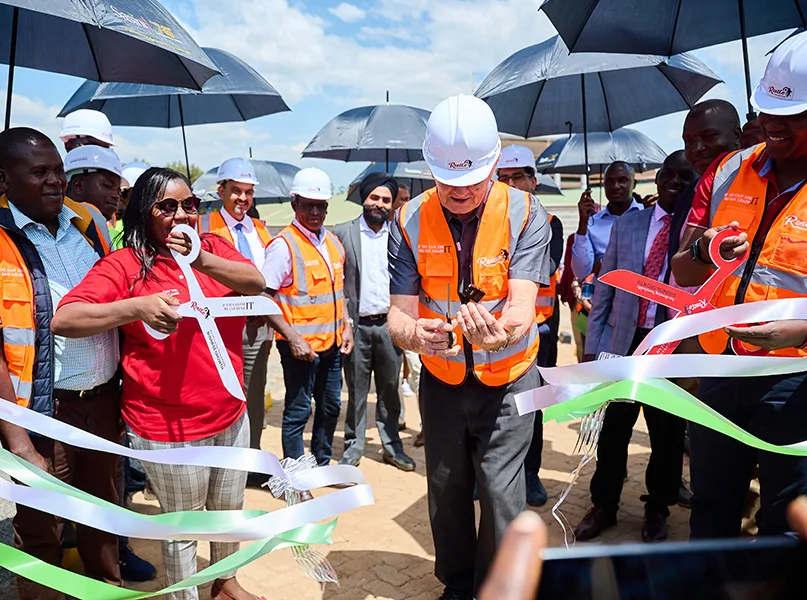
COMMITTED TO THE COMMUNITY
With a deep belief in managing its activities holistically and considerately, Sasini’s nine SDGs are not limited to business alone but are rooted in benefitting the communities in which it operates.
As such, the company has opened schools across all its plantations as well as health centres and programmes to support the provision of potable water.
The company’s work in water stewardship seeks to increase public access to clean, potable water in remote and rural areas, especially those around its tea plantations in the counties of Nyamira and Kericho.
As such, Sasini has committed to sinking three water boreholes annually for the next decade across this vast area.
“We started this project last year, and we’re going to continue with it until we achieve our goal,” Ochien’g divulges.
In addition, Sasini has educated 75,000 farmers across the business on regenerative agriculture.
This benefits both parties as practical agricultural knowledge is imparted to the communities that the company regularly buys its crops from.
“Crucially, we empower our farmers with competitive payment for their produce, enabling them to reinvest in their crops and continue to supply our business,” he informs us.
Further to this, Sasini is proud of the way it renumerates those who work directly for the company and has recently set itself a target to implement the living wage principle.
By paying its staff wages that enable a comfortable lifestyle, Sasini hopes to increase employee satisfaction and retention – a system that’s already been successfully trialled across its tea business.
“We’re deeply committed to treating our staff right. We want to attract the best talent to the organisation to help us achieve the ambitious goals we’ve set,” Ochien’g sets out.
Elsewhere, Sasini is carrying out work in recycling, meaning harmful or hazardous waste is disposed of professionally, and has a zero-tolerance policy towards corruption in any part of its value chain.

INNOVATION ENABLES AUTOMATION
Another element of Sasini’s underpinning strategy is to use innovation and technology to drive efficiency and minimise overall costs.
Over the past five years, the company has been on a journey to automate as many parts of its production processes as possible.
This is most evident in the tea business, where Sasini has completely automated harvesting across its estates by implementing machine plucking.
“Five years ago, we were plucking all of our tea by hand, whereas today we’ve completely automated the whole process,” Ochien’g prides.
This has helped Sasini to successfully reduce its overall tea production costs, enabling it to reinvest surplus finances in sustainable and green projects for the benefit of local communities.
In addition, the company boasts one of the most modern macadamia processing plants in the region.
Built in 2018, the facility enjoys all the latest technologies and is highly automated, as is Sasini’s avocado packhouse, which launched only four years ago.
The company has also implemented modern enterprise resource planning (ERP) tools in its offices, which help it to work more efficiently but at a lower cost.
“Evidently, we continue to pursue automation across the board, and not only on the operational side of things,” he elaborates.
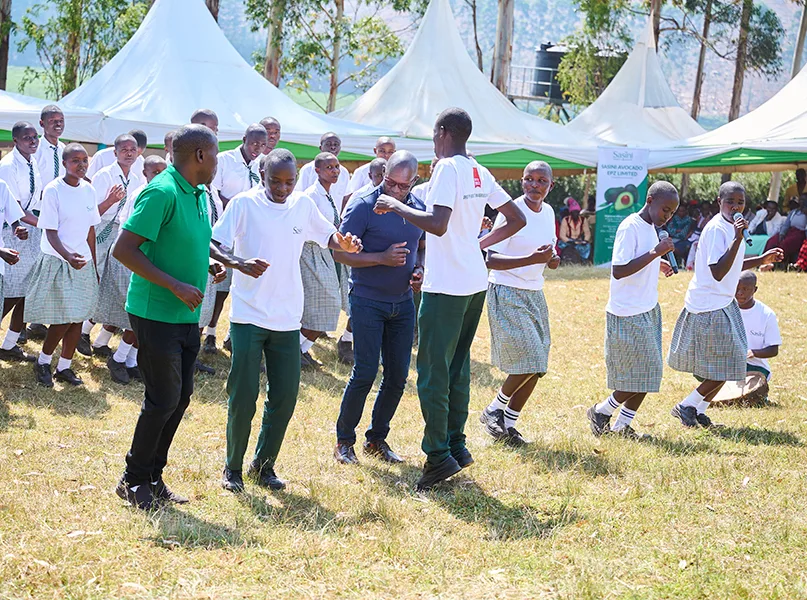
DEEP-ROOTED EQUALITY
To embed inclusivity deeply across the organisation, Sasini is working tirelessly to achieve gender equality and equity.
Over the last five years, it has been able to progress this to a desirable level, and by 2026, it hopes to achieve gender parity across the workforce.
“Our male-to-female ratio currently sits at around 60:40, so we’re confident we’re on the right track to achieve our goal,” Ochien’g relays.
It’s not just 40 percent of Sasini’s general workforce that’s made up of women, either, as this figure also applies to the company’s leadership team.
This feeds into Sasini’s long-term mission to increase support for businesses owned or run by women across the supply chain.
“I would say 70 percent of our supply chain spend is local, which is critical in supporting small and micro-enterprises in the area. Our goal is to have 10-15 percent of that going to women-led businesses,” he details.
The other 30 percent of Sasini’s supply chain spend is international due to the procurement of agricultural inputs and machinery from abroad, which is critical to help the company stay ahead of the curve and remain competitive.
“Although we’re yet to meet our spending goal in terms of supporting women-run enterprises, we are committed to promoting the gender aspect of the supply chain alongside big corporations,” Ochien’g says.
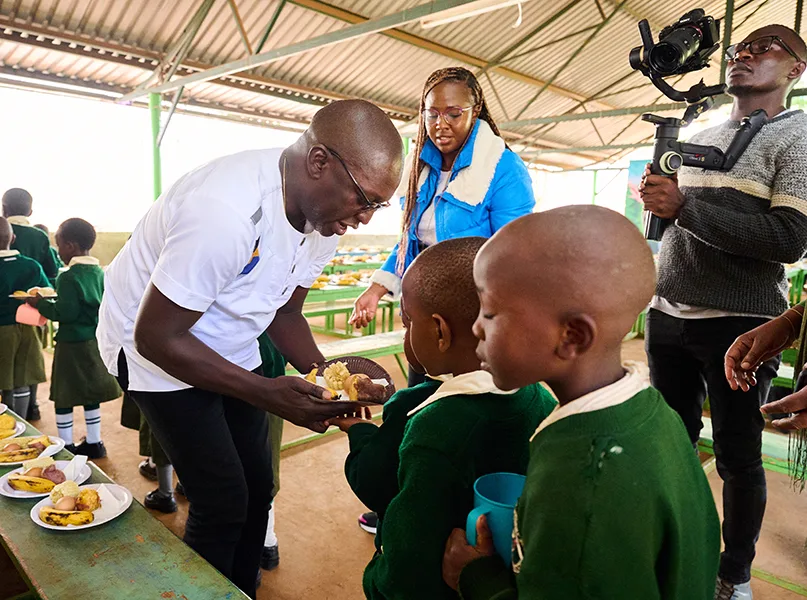
FUTURE FOCUS
Looking to the future, Sasini will centre its activities around specific goals to help it continue to thrive amidst a continually fluctuating market.
A major part of this is accelerating top and bottom-line growth through bolt-on mergers and acquisitions with organisations that share similar goals.
“To achieve both scale and impact going forward, we seek partnerships with like-minded organisations that want to push for the same objectives as us whilst helping us finance these projects,” Ochien’g explains.
Diversifying its produce is also a key strategic pillar of Sasini’s growth plan, which will enhance the company’s revenue streams and influence on global value chains.
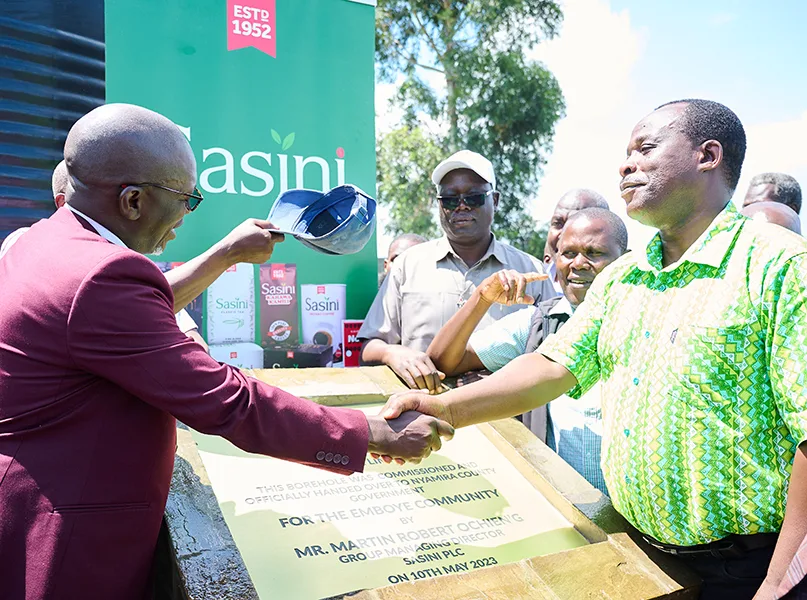
Meanwhile, it is hoped that expanding the business in East Africa, such as into the Democratic Republic of the Congo (DRC) and Uganda, will help Sasini achieve its goal of being the region’s biggest agricultural business.
“Currently, all our business and crops are sourced locally in Kenya, even though we process and export them internationally. Regional growth could aid our geographic expansion as a company.”
Sasini will also continue to innovate and implement new technologies to improve efficiencies and manage costs across the organisation, whilst ESG and SDGs continue to drive the business forward.
Lastly, to ensure it employs people with the right skills, training will be key to Sasini achieving these goals.
“Attracting and retaining the right people is imperative for our continued growth and success,” Ochien’g passionately concludes.



